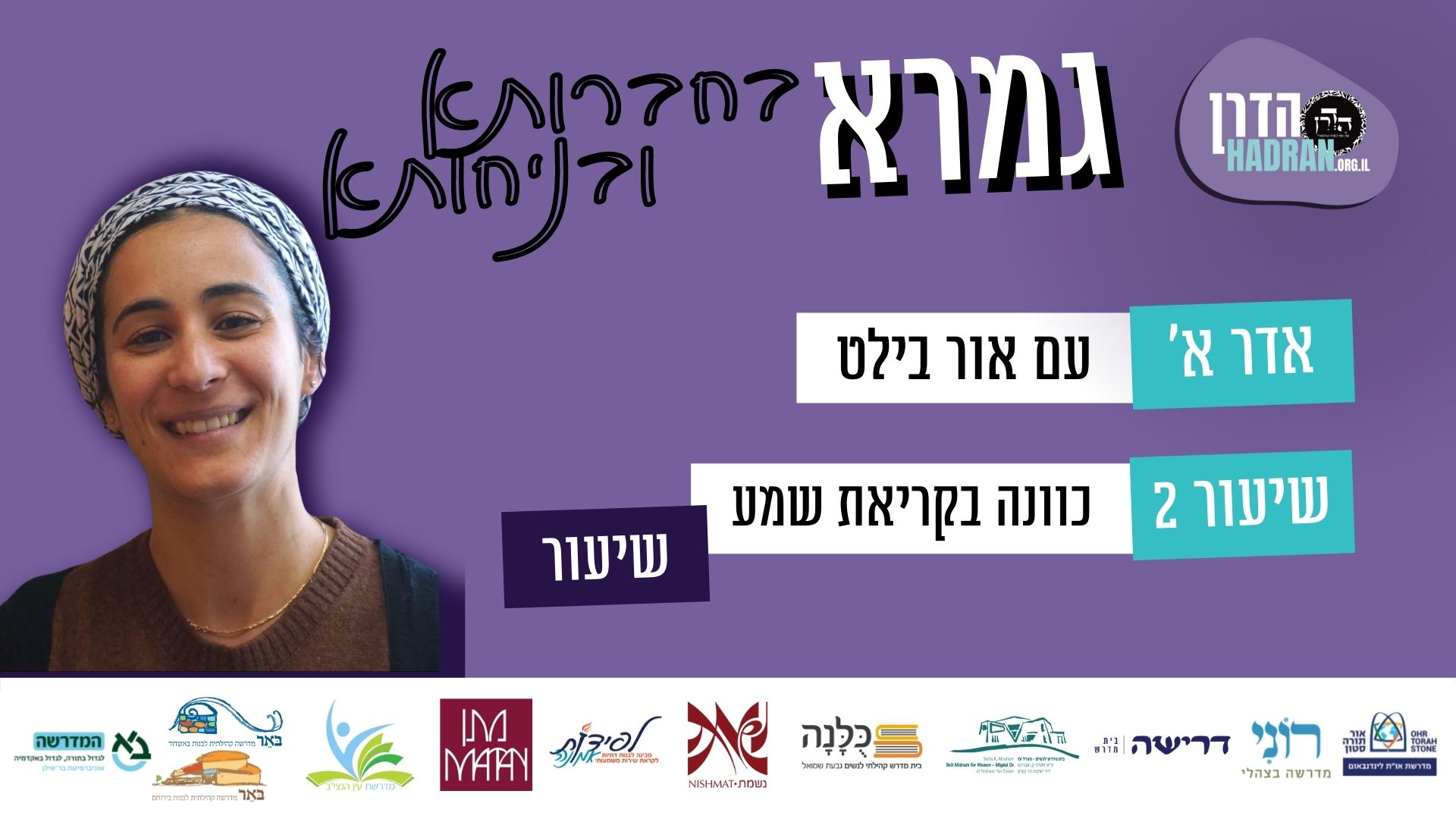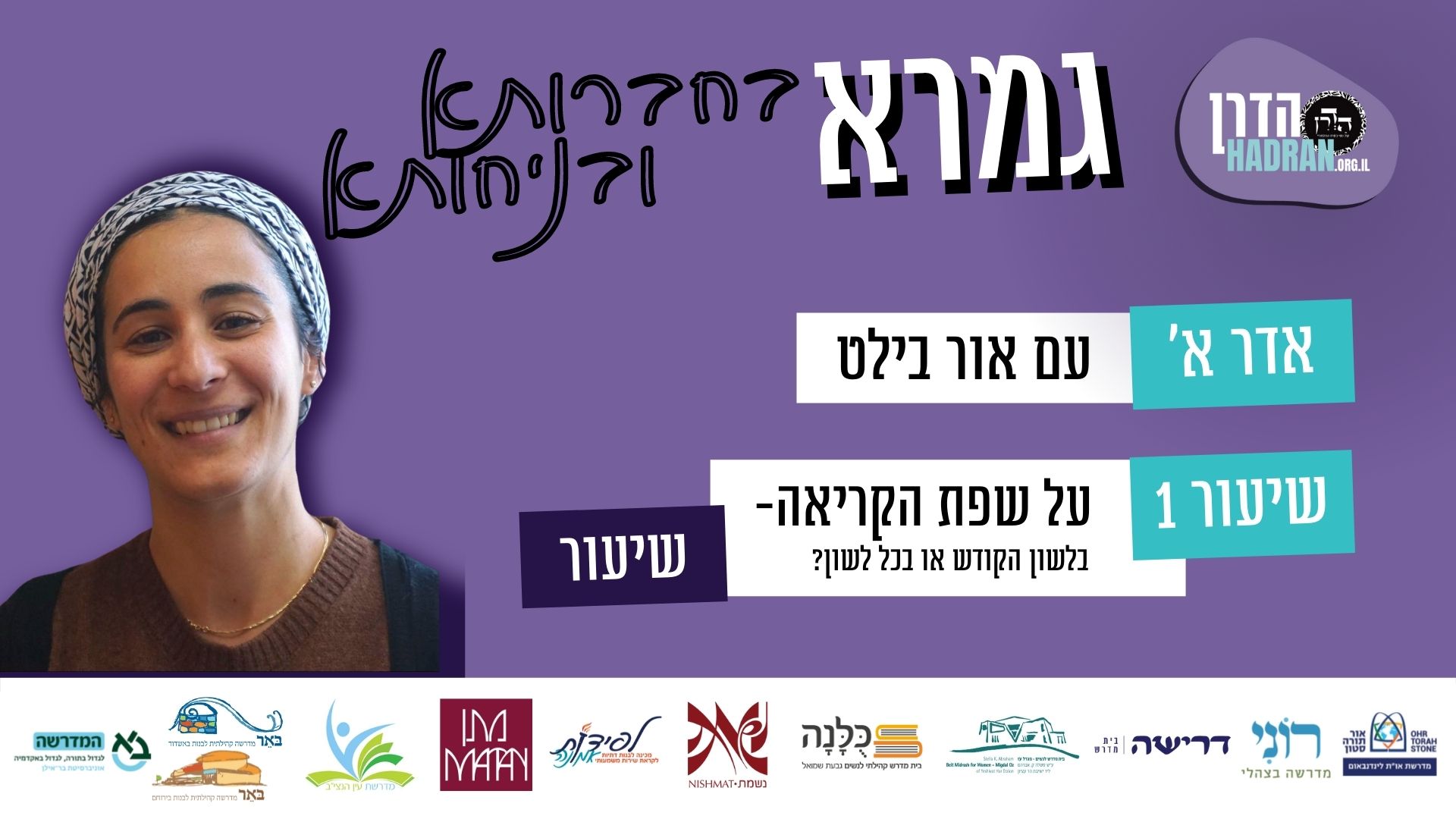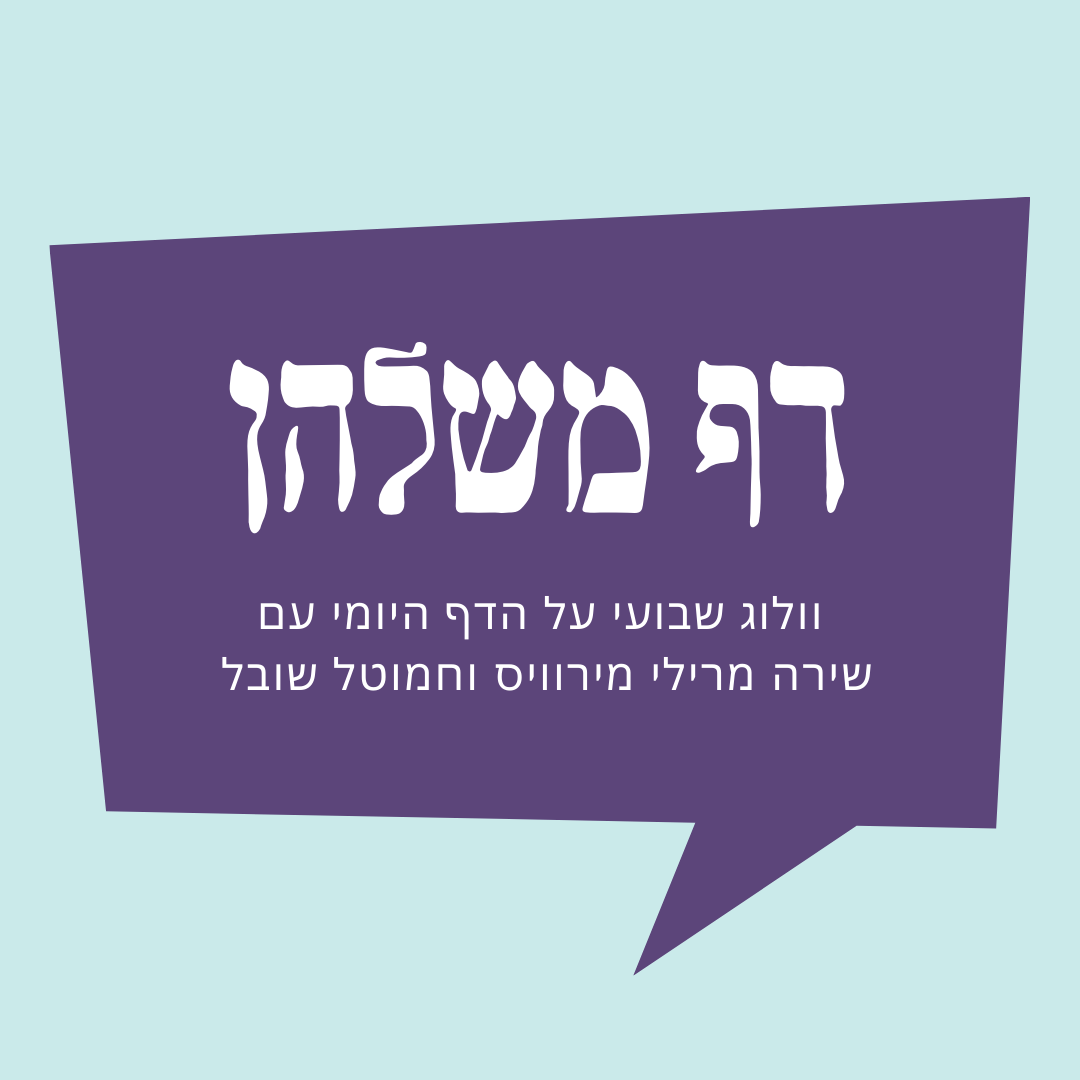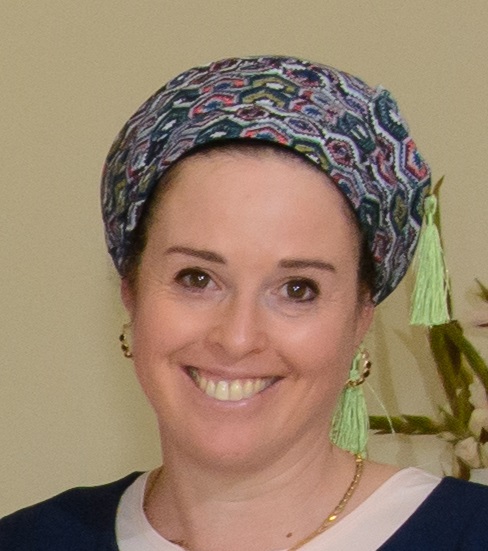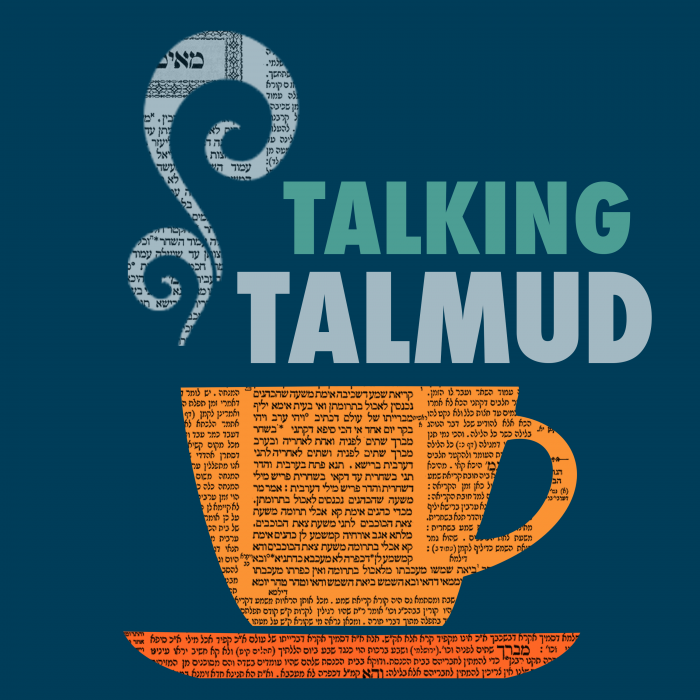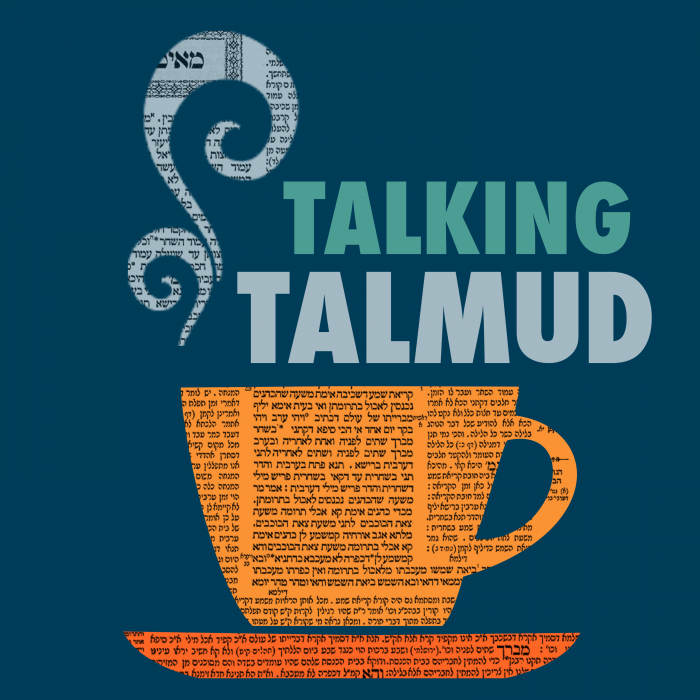מי כדאי שיברך על הפת בעבור כולם – בעל הבית או החשוב בארוחה? ומה לגבי זימון? מה נוסח הברכה שמכניסים לברכת המזון בעבור בעל הבית? איפה מסתיימת ברכת הזימון – בקטע שמוסיפים לפני ברכת המזון או בסוף הברכה הראשונה? האבל מברך נוסח שונה לברכת הטוב והמיטיב שבו יש תוכן של דיין אמת. יש שיחה בין ריש גלותא לרב ששת שבה הריש גלותא משבח מנהגי סעודה של הפרסיים לעומת החכמים ורב ששת מנסה להוכיח שהלכות סעודה של החכמים גם ראוי לשבחים.
רוצה להקדיש שיעור?
כלים
העמקה
רוצה להבין מה באמת קורה מתחת לפני השטח של הסוגיה?
שיעורים, פודקאסטים והרחבות של מיטב המורות שלנו יפתחו לך עוד זוויות וכיווני חשיבה.
חדשה בלימוד הגמרא?
זה הדף הראשון שלך? איזו התרגשות עצומה! יש לנו בדיוק את התכנים והכלים שיעזרו לך לעשות את הצעדים הראשונים ללמידה בקצב וברמה שלך, כך תוכלי להרגיש בנוח גם בתוך הסוגיות המורכבות ומאתגרות.
פסיפס הלומדות שלנו
גלי את קהילת הלומדות שלנו, מגוון נשים, רקעים וסיפורים. כולן חלק מתנועה ומסע מרגש ועוצמתי.
ברכות מו
רַבִּי זֵירָא חֲלַשׁ, עָל לְגַבֵּיהּ רַבִּי אֲבָהוּ, קַבֵּיל עֲלֵיהּ: אִי מִתְּפַח קַטִּינָא חֲרִיךְ שָׁקֵי — עָבֵידְנָא יוֹמָא טָבָא לְרַבָּנַן. אִתְּפַח, עֲבַד סְעוֹדְתָּא לְכוּלְּהוּ רַבָּנַן. כִּי מְטָא לְמִשְׁרֵי אֲמַר לֵיהּ לְרַבִּי זֵירָא: לִישְׁרֵי לַן מָר. אֲמַר לֵיהּ: לָא סָבַר לַהּ מָר לְהָא דְּרַבִּי יוֹחָנָן דְּאָמַר: בַּעַל הַבַּיִת בּוֹצֵעַ? שְׁרָא לְהוּ.
The Gemara recounts: Rabbi Zeira took ill. Rabbi Abbahu went to visit him and resolved: If the little man with the scorched legs, a nickname for Rabbi Zeira, is cured, I will make a festival, a feast, for the Sages. Rabbi Zeira was cured and Rabbi Abbahu made a feast for all the Sages. When it came time to break bread, Rabbi Abbahu said to Rabbi Zeira: Master, please break bread for us. Rabbi Zeira said to him: Doesn’t the Master hold in accordance with that halakha of Rabbi Yoḥanan, who said: The host breaks bread? Rabbi Abbahu broke bread for them.
כִּי מְטָא לְבָרוֹכֵי, אֲמַר לֵיהּ: נְבָרֵיךְ לַן מָר. אֲמַר לֵיהּ: לָא סָבַר לַהּ מָר לְהָא דְּרַב הוּנָא דְּמִן בָּבֶל דְּאָמַר: בּוֹצֵעַ מְבָרֵךְ?
When the time came to recite the blessing, Rabbi Abbahu said to Rabbi Zeira: Master, recite Grace after Meals on our behalf. Rabbi Zeira said to him: Doesn’t the Master hold in accordance with that halakha of Rabbi Huna of Babylonia, who said: He who breaks bread recites Grace after Meals?
וְאִיהוּ, כְּמַאן סְבִירָא לֵיהּ?
The Gemara asks: And in accordance with whose opinion does Rabbi Abbahu hold that he asked Rabbi Zeira to recite Grace after Meals?
כִּי הָא דְּאָמַר רַבִּי יוֹחָנָן מִשּׁוּם רַבִּי שִׁמְעוֹן בֶּן יוֹחַי: בַּעַל הַבַּיִת בּוֹצֵעַ, וְאוֹרֵחַ מְבָרֵךְ. בַּעַל הַבַּיִת בּוֹצֵעַ — כְּדֵי שֶׁיִּבְצַע בְּעַיִן יָפָה. וְאוֹרֵחַ מְבָרֵךְ — כְּדֵי שֶׁיְּבָרֵךְ בַּעַל הַבַּיִת.
The Gemara answers: Rabbi Abbahu holds in accordance with that halakha that Rabbi Yoḥanan said in the name of Rabbi Shimon ben Yoḥai: The host breaks bread and a guest recites Grace after Meals. The host breaks bread so that he will break bread generously, whereas a guest might be embarrassed to break a large piece for himself and other guests; and the guest recites Grace after Meals so that he may bless the host in the course of reciting Grace after Meals, as the Gemara proceeds to explain.
מַאי מְבָרֵךְ — ״יְהִי רָצוֹן שֶׁלֹּא יֵבוֹשׁ בַּעַל הַבַּיִת בָּעוֹלָם הַזֶּה, וְלֹא יִכָּלֵם לְעוֹלָם הַבָּא״.
What is the formula of the blessing with which the guest blesses his host?
May it be Your will that the master of the house shall not suffer shame in this world, nor humiliation in the World-to-Come.
וְרַבִּי מוֹסִיף בָּהּ דְּבָרִים: ״וְיִצְלַח מְאֹד בְּכָל נְכָסָיו, וְיִהְיוּ נְכָסָיו וּנְכָסֵינוּ מוּצְלָחִים וּקְרוֹבִים לָעִיר, וְאַל יִשְׁלוֹט שָׂטָן לֹא בְּמַעֲשֵׂי יָדָיו וְלֹא בְּמַעֲשֵׂי יָדֵינוּ, וְאַל יִזְדַּקֵּר לֹא לְפָנָיו וְלֹא לְפָנֵינוּ שׁוּם דְּבַר הִרְהוּר חֵטְא וַעֲבֵירָה וְעָוֹן מֵעַתָּה וְעַד עוֹלָם״.
Rabbi Yehuda HaNasi added to it elements pertaining to material success:
And may he be very successful with all his possessions,
and may his possessions and our possessions be successful and near the city,
and may Satan control neither his deeds nor our deeds,
and may no thought of sin, iniquity, or transgression stand before him or before us
from now and for evermore.
עַד הֵיכָן בִּרְכַּת הַזִּמּוּן.
The Gemara asks: Until where does the zimmun blessing extend?
רַב נַחְמָן אָמַר עַד ״נְבָרֵךְ״, וְרַב שֵׁשֶׁת אָמַר, עַד ״הַזָּן״.
Rav Naḥman says: The blessing extends only until: Let us bless. Rav Sheshet says that the zimmun blessing extends until the end of the first blessing of Grace after Meals: Who feeds all.
נֵימָא כְּתַנָּאֵי, דְּתָנֵי חֲדָא: בִּרְכַּת הַמָּזוֹן שְׁנַיִם וּשְׁלֹשָׁה, וְתַנְיָא אִידַּךְ: שְׁלֹשָׁה וְאַרְבָּעָה. סַבְרוּהָ, דְּכוּלֵּי עָלְמָא ״הַטּוֹב וְהַמֵּטִיב״ לָאו דְּאוֹרָיְיתָא הִיא, מַאי לָאו בְּהָא קָמִיפַּלְגִי: מַאן דְּאָמַר שְׁתַּיִם וְשָׁלֹשׁ קָסָבַר עַד ״הַזָּן״. — וּמַאן דְּאָמַר שָׁלֹשׁ וְאַרְבַּע קָסָבַר עַד ״נְבָרֵךְ״.
The Gemara proposes: Let us say that this amoraic dispute is parallel to a dispute between the tanna’im. As one baraita taught: Grace after Meals is two and three blessings, and another baraita taught: Grace after Meals is three and four blessings. In attempting to understand these conflicting baraitot, the Sages assumed that everyone agrees that the blessing: Who is good and does good, the fourth blessing of Grace after Meals, is not required by Torah law. What then? Is it not that they disagree about this: The one who said that Grace after Meals is two and three blessings holds that the zimmun blessing extends until the end of the blessing: Who feeds all? If there is a zimmun, three blessings are recited; if there is no zimmun, only two blessings are recited, since the blessing: Who feeds all, is not recited. And the one who said that Grace after Meals is three and four blessings holds that the zimmun blessing extends only until: Let us bless, and includes no part of Grace after Meals itself. If there is a zimmun, four blessings are recited, the three blessing of Grace after Meals plus the blessing of the zimmun, while if there is not, only three blessings are recited.
לָא, רַב נַחְמָן מְתָרֵץ לְטַעְמֵיהּ, וְרַב שֵׁשֶׁת מְתָרֵץ לְטַעְמֵיהּ:
This explanation distinguishing between the baraitot is rejected: No; Rav Naḥman explains in accordance with his reasoning and Rav Sheshet explains in accordance with his reasoning.
רַב נַחְמָן מְתָרֵץ לְטַעְמֵיהּ, דְּכוּלֵּי עָלְמָא עַד ״נְבָרֵךְ״. מַאן דְּאָמַר שָׁלֹשׁ וְאַרְבַּע — שַׁפִּיר, וּמַאן דְּאָמַר שְׁתַּיִם וְשָׁלֹשׁ — אָמַר לָךְ הָכָא בְּבִרְכַּת פּוֹעֲלִים עָסְקִינַן, דְּאָמַר מָר, פּוֹתֵחַ בְּ״הַזָּן״ וְכוֹלֵל ״בּוֹנֵה יְרוּשָׁלַיִם״ בְּבִרְכַּת הָאָרֶץ.
Rav Naḥman explains in accordance with his reasoning; everyone agrees that the zimmun blessing extends only until Let us bless. According to the one who said that Grace after Meals is three and four blessings, this works out well. And the one who said that Grace after Meals is two and three blessings could have said to you: Here we are dealing with the blessing recited by laborers, as the Master said that when a laborer is working, he is permitted to abridge Grace after Meals, and he begins with the blessing: Who feeds all, and includes the third blessing: Who builds Jerusalem, in the context of the second blessing, the blessing of the land.
רַב שֵׁשֶׁת מְתָרֵץ לְטַעְמֵיהּ, דְּכוּלֵּי עָלְמָא עַד ״הַזָּן״. מַאן דְּאָמַר שְׁתַּיִם וְשָׁלֹשׁ — שַׁפִּיר, וּמַאן דְּאָמַר שָׁלֹשׁ וְאַרְבַּע קָסָבַר ״הַטּוֹב וְהַמֵּטִיב״ דְּאוֹרָיְיתָא הִיא.
Rav Sheshet explains in accordance with his reasoning; everyone agrees that the zimmun blessing extends until the end of the blessing: Who feeds all. According to the one who said that Grace after Meals is two and three blessings, this works out well; and the one who said that Grace after Meals is three and four blessings holds that the blessing: Who is good and does good, is required by Torah law.
אָמַר רַב יוֹסֵף: תִּדַּע דְּ״הַטּוֹב וְהַמֵּטִיב״ לָאו דְּאוֹרָיְיתָא — שֶׁהֲרֵי פּוֹעֲלִים עוֹקְרִים אוֹתָהּ.
With regard to the matter of the blessing: Who is good and does good, Rav Yosef said: Know that the blessing: Who is good and does good, is not required by Torah law, as laborers who recite Grace after Meals at work eliminate it. If it can be eliminated, it could not be a Torah obligation.
אָמַר רַב יִצְחָק בַּר שְׁמוּאֵל בַּר מָרְתָא מִשְּׁמֵיהּ דְּרַב תִּדַּע דְּ״הַטּוֹב וְהַמֵּטִיב״ לָאו דְּאוֹרָיְיתָא שֶׁהֲרֵי פּוֹתֵחַ בָּהּ בְּ״בָרוּךְ״ וְאֵין חוֹתֵם בָּהּ בְּ״בָרוּךְ״, כִּדְתַנְיָא: כׇּל הַבְּרָכוֹת כּוּלָּן פּוֹתֵחַ בָּהֶן בְּ״בָרוּךְ״ וְחוֹתֵם בָּהֶן בְּ״בָרוּךְ״, חוּץ מִבִּרְכַּת הַפֵּירוֹת וּבִרְכַּת הַמִּצְווֹת, וּבְרָכָה הַסְּמוּכָה לַחֲבֶרְתָּהּ, וּבְרָכָה אַחֲרוֹנָה שֶׁבִּקְרִיאַת שְׁמַע, יֵשׁ מֵהֶן שֶׁפּוֹתֵחַ בָּהֶן בְּ״בָרוּךְ״ וְאֵין חוֹתֵם בְּ״בָרוּךְ״,
Rav Yitzḥak bar Shmuel bar Marta said another proof in the name of Rav: Know that the blessing: Who is good and does good, is not required by Torah law, as one who recites it begins to recite it with: Blessed, but does not conclude reciting it with: Blessed. This is the formula in all comparable blessings, as it was taught in a baraita: All blessings, one begins to recite them with: Blessed, and concludes reciting them with: Blessed, except for blessings over fruit, blessings over mitzvot, a blessing that is juxtaposed to another blessing, and the final blessing after Shema. There are among these blessings those that one who recites it begins to recite it with: Blessed, but does not conclude reciting it with: Blessed;
וְיֵשׁ מֵהֶן שֶׁחוֹתֵם בָּהֶן בְּ״בָרוּךְ״ וְאֵין פּוֹתֵחַ בְּ״בָרוּךְ״. וְ״הַטּוֹב וְהַמֵּטִיב״ פּוֹתֵחַ בְּ״בָרוּךְ״ וְאֵין חוֹתֵם בְּ״בָרוּךְ״. מִכְּלָל דִּבְרָכָה בִּפְנֵי עַצְמָהּ הִיא.
and there are among these blessings that one who recites it concludes reciting it with: Blessed, but does not begin reciting it with: Blessed. The blessing: Who is good and does good, one who recites it begins to recite it with: Blessed, but does not conclude reciting it with: Blessed. This proves by inference that it is an independent blessing.
וְאָמַר רַב נַחְמָן בַּר יִצְחָק: תִּדַּע דְּ״הַטּוֹב וְהַמֵּטִיב״ לָאו דְּאוֹרָיְיתָא — שֶׁהֲרֵי עוֹקְרִין אוֹתָהּ בְּבֵית הָאֵבֶל. כִּדְתַנְיָא: מָה הֵם אוֹמְרִים בְּבֵית הָאֵבֶל? — ״בָּרוּךְ הַטּוֹב וְהַמֵּטִיב״. רַבִּי עֲקִיבָא אוֹמֵר: ״בָּרוּךְ דַּיַּין הָאֱמֶת״.
And Rav Naḥman bar Yitzḥak said: Know that the blessing: Who is good and does good, is not required by Torah law, as it is eliminated in the house of the mourner, as it was taught in a baraita according to the opinion of Rabbi Akiva: What do they say in the house of the mourner? Blessed…Who is good and does good. Rabbi Akiva says: Blessed…the true Judge.
״הַטּוֹב וְהַמֵּטִיב״ — אִין, ״דַּיַּין אֱמֶת״ — לָא?! אֶלָּא אֵימָא אַף ״הַטּוֹב וְהַמֵּטִיב״.
The first opinion in the baraita is challenged: Who is good and does good, yes, it is recited in the house of the mourner, the true Judge, no, it is not recited? Rather, say: Who is good and does good, is recited as well.
מָר זוּטְרָא אִיקְּלַע לְבֵי רַב אָשֵׁי, אִיתְּרַע בֵּיהּ מִלְּתָא, פְּתַח וּבָרֵיךְ: ״הַטּוֹב וְהַמֵּטִיב, אֵל אֱמֶת, דַּיַּין אֱמֶת, שׁוֹפֵט בְּצֶדֶק, לוֹקֵחַ בַּמִּשְׁפָּט, וְשַׁלִּיט בְּעוֹלָמוֹ לַעֲשׂוֹת בּוֹ כִּרְצוֹנוֹ, כִּי כׇל דְּרָכָיו מִשְׁפָּט, שֶׁהַכֹּל שֶׁלּוֹ וַאֲנַחְנוּ עַמּוֹ וַעֲבָדָיו, וּבַכֹּל אֲנַחְנוּ חַיָּיבִים לְהוֹדוֹת לוֹ וּלְבָרְכוֹ, גּוֹדֵר פְּרָצוֹת בְּיִשְׂרָאֵל הוּא יִגְדּוֹר אֶת הַפִּרְצָה הַזֹּאת בְּיִשְׂרָאֵל לְחַיִּים״.
The Gemara recounts: Mar Zutra happened to come to Rav Ashi’s home when an incident of mourning befell Rav Ashi. Mar Zutra began a combined blessing and recited:
Who is good and does good,
God of truth, the true Judge,
Who judges with righteousness, takes away with justice,
and is the ruler of His world to do in it as He wills,
as all His ways are just,
that all is His and we are His people and His servants,
and in everything we are obligated to thank Him and bless Him,
Who repairs the breaches in Israel,
He will repair this breach in Israel for life.
Mar Zutra included both: Who is good and does good, as well as mourning and acceptance of divine justice.
לְהֵיכָן הוּא חוֹזֵר? רַב זְבִיד מִשְּׁמֵיהּ דְּאַבָּיֵי אָמַר: חוֹזֵר לָרֹאשׁ, וְרַבָּנַן אָמְרִי לַמָּקוֹם שֶׁפָּסַק, וְהִלְכְתָא לַמָּקוֹם שֶׁפָּסַק.
Returning to the original topic, it was mentioned above that one interrupts his meal to form a zimmun with two others who finished eating. The question is raised: To where does he return when he finishes his own meal and must begin to recite his own Grace after Meals? Rav Zevid in the name of Abaye said: He returns to the beginning and recites the entire Grace after Meals. And the Rabbis say: He returns to the place that he stopped. And the halakha is: He returns to the place that he stopped, i.e., to the beginning of the second blessing.
אֲמַר לֵיהּ רֵישׁ גָּלוּתָא לְרַב שֵׁשֶׁת: אַף עַל גַּב דְּרַבָּנַן קַשִּׁישֵׁי אַתּוּן, פָּרְסָאֵי בְּצׇרְכֵי סְעוּדָה בְּקִיאִי מִינַּיְיכוּ. בִּזְמַן שֶׁהֵן שְׁתֵּי מִטּוֹת, גָּדוֹל — מֵסֵב בָּרֹאשׁ, וְשֵׁנִי לוֹ — לְמַעְלָה הֵימֶנּוּ. וּבִזְמַן שֶׁהֵם שָׁלֹשׁ, גָּדוֹל — מֵסֵב בָּאֶמְצַע, שֵׁנִי לוֹ — לְמַעְלָה הֵימֶנּוּ, שְׁלִישִׁי לוֹ — לְמַטָּה הֵימֶנּוּ.
On the topic of meals, the Gemara relates the following: The Exilarch said to Rav Sheshet: Although you are elderly Sages, the Persians are more expert than you with regard to the required etiquette at meals. The Persian custom is that when there are two divans on which they would recline, the greater of the two people reclines first and the person second to him in importance reclines on the divan above him, alongside his head. When there are three divans, the greatest of the three reclines on the middle divan, the one second to him in importance reclines on the divan above him, and the one third to him in importance reclines on the divan below the greatest of the three.
אֲמַר לֵיהּ, וְכִי בָּעֵי אִישְׁתַּעוֹיֵי בַּהֲדֵיהּ, מְתָרֵיץ תָּרוֹצֵי וְיָתֵיב וּמִשְׁתַּעֵי בַּהֲדֵיהּ?! אֲמַר לֵיהּ: שָׁאנֵי פָּרְסָאֵי, דְּמַחְוֵי לֵיהּ בְּמָחוֹג.
Rav Sheshet said to the Exilarch that the custom is flawed. If the greater wishes to speak with the one second to him in importance who is reclining above his head, he must straighten up and sit and only then will he be able to speak to him. The Exilarch answered: The Persians are different, as they signal and communicate with hand gestures, especially during mealtimes, so there is no need to sit up.
מַיִם רִאשׁוֹנִים מֵהֵיכָן מַתְחִילִין? אֲמַר לֵיהּ: מִן הַגָּדוֹל.
Rav Sheshet asked the Exilarch about the Persian practice with regard to the first waters. When washing hands before the meal, from where do they begin? The Exilarch said to him: They begin from the greatest.
יֵשֵׁב גָּדוֹל וְיִשְׁמוֹר יָדָיו עַד שֶׁנּוֹטְלִין כּוּלָּן? אֲמַר לֵיהּ: לְאַלְתַּר מַיְיתוּ תַּכָּא קַמֵּיהּ.
Rav Sheshet asked: If that is so, should the greatest person present sit and keep his hands clean and wait until everyone has washed so that they may all be served? The Exilarch said to him: They bring him his table [takka] immediately, as the custom was that each person ate at his own private table, and they brought the table before the greatest person present immediately after he washed so that he need not wait for the others.
מַיִם אַחֲרוֹנִים מֵהֵיכָן מַתְחִילִין? אֲמַר לֵיהּ: מִן הַקָּטָן.
Rav Sheshet asked the Exilarch about the Persian practice with regard to the final waters. When washing hands after the meal, from where do they begin? The Exilarch said to him: They begin with the least significant of the attendees.
וְגָדוֹל יָתֵיב וְיָדָיו מְזוֹהָמוֹת עַד שֶׁנּוֹטְלִין כּוּלָּן? אֲמַר לֵיהּ: לָא מְסַלְּקִי תַּכָּא מִקַּמֵּיהּ עַד דְּנִימְטֵי מַיָּא לְגַבֵּיהּ.
Rav Sheshet said: If so, should the greatest person present sit with dirty hands until everyone washes his hands? The Exilarch said to him: They do not remove the table from before him until the water reaches him; he can continue eating while the others are washing.
אֲמַר רַב שֵׁשֶׁת: אֲנָא מַתְנִיתָא יָדַעְנָא, דְּתַנְיָא: כֵּיצַד סֵדֶר הֲסִבָּה? — בִּזְמַן שֶׁהֵן שְׁתֵּי מִטּוֹת — גָּדוֹל מֵסֵב בָּרֹאשׁ, וְשֵׁנִי לוֹ לְמַטָּה הֵימֶנּוּ. בִּזְמַן שֶׁהֵן שָׁלֹשׁ מִטּוֹת — גָּדוֹל מֵסֵב בָּרֹאשׁ, שֵׁנִי לוֹ לְמַעְלָה הֵימֶנּוּ, שְׁלִישִׁי לוֹ לְמַטָּה הֵימֶנּוּ. מַיִם הָרִאשׁוֹנִים מַתְחִילִין מִן הַגָּדוֹל. מַיִם אַחֲרוֹנִים, בִּזְמַן שֶׁהֵם חֲמִשָּׁה — מַתְחִילִין מִן הַגָּדוֹל, וּבִזְמַן שֶׁהֵם מֵאָה — מַתְחִילִין מִן הַקָּטָן עַד שֶׁמַּגִּיעִים אֵצֶל חֲמִישִׁי, וְחוֹזְרִין וּמַתְחִילִין מִן הַגָּדוֹל. וְלִמְקוֹם שֶׁמַּיִם אַחֲרוֹנִים חוֹזְרִין — לְשָׁם בְּרָכָה חוֹזֶרֶת.
Rav Sheshet said: In terms of conduct at a meal, I know a baraita, as it was taught: What is the order of reclining? When there are two divans on which they would recline, the greater of the two people reclines first, and the person second to him in importance reclines on the divan below him. When there are three divans, the greatest of the three reclines first, on the middle divan, the one second to him in importance reclines on the divan above him, and the one third to him in importance reclines on the divan below the greatest of the three. The first waters before the meal, they begin with the greatest person present. The final waters; when they are five people, they begin with the greatest person present. When they are more than that, even one hundred, they begin the final waters with the least significant of the attendees until they reach the five greatest present, at which point they return and begin with the greatest present. And to the place that the final waters return the blessing also reverts, and the greatest present, the first among the final five to wash his hands, recites Grace after Meals.
מְסַיַּיע לֵיהּ לְרַב, דְּאָמַר רַבִּי חִיָּיא בַּר אָשֵׁי אָמַר רַב: כׇּל הַנּוֹטֵל יָדָיו בָּאַחֲרוֹנָה תְּחִלָּה — הוּא מְזוּמָּן לִבְרָכָה.
This baraita supports the opinion of Rav, as Rabbi Ḥiyya bar Ashi said that Rav said: Whoever washes his hands first at the end of the meal is designated to recite the blessing of Grace after Meals.
רַב וְרַבִּי חִיָּיא הֲווֹ יָתְבִי בִּסְעוֹדְתָּא קַמֵּיהּ דְּרַבִּי, אֲמַר לֵיהּ רַבִּי לְרַב: קוּם, מְשִׁי יְדָךְ. חַזְיֵיהּ דְּקָא מְרַתֵּת. אֲמַר לֵיהּ: בַּר פַּחֲתֵי, ״עַיֵּין בְּבִרְכַּת מְזוֹנָא״ קָאָמַר לָךְ.
Similarly, the Gemara relates: Rav and Rabbi Ḥiyya were seated at a meal before Rabbi Yehuda HaNasi. Rabbi Yehuda HaNasi said to Rav: Stand, wash your hands. Rabbi Ḥiyya saw that Rav was trembling in fear that perhaps he had conducted himself improperly during the meal and therefore had to wash his hands. Rabbi Ḥiyya said to him: Son of noblemen, he is saying to you to review Grace after Meals, as the first to wash his hands after the meal is honored with leading the blessing.
תָּנוּ רַבָּנַן: אֵין מְכַבְּדִין לֹא בִּדְרָכִים וְלֹא בִּגְשָׁרִים,
The Gemara continues to discuss the topic of washing after a meal. The Sages taught: Although it is customary to defer to greater people, nevertheless, one shows deference neither on roads nor on bridges,


